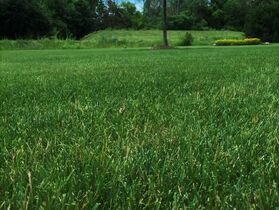 This is a Q&A blog series on healthy organic turf. If you have a question for Good Sweet Earth's lawn guy, Steve, shoot him an email at [email protected], and include "Ask the Lawn Guy" in the subject line. I got this question via email last week: Give me one good reason why I should have an organic lawn. Modern science has given us tools to have a green lawn without weeds, why shouldn't I use them? I can do better than one good reason, I can give you three. First, healthy grass comes from healthy soil. Synthetic chemical fertilizers kill your soil, which in turn kills your turf and makes it overly reliant on chemicals. Dead, sterile soil is also a breeding ground for weeds and disease. Organic fertilization focuses on feeding your soil and developing a healthy ecosystem of bacteria, fungi, worms and other life below the surface of your yard. We use vermicompost (nutrient-rich compost made by earthworms), microbial tea (a liquid rich in microbes to help break down organic matter in your soil), and all-natural slow-release fertilizers. Modern science may have convinced us we can only grow a healthy yard with synthetic chemicals, but nature itself has given us the most effective ways to grow things: water, microbes and organic matter. We've only had synthetic chemicals for our lawns for about 60 years, but things grew just fine for billions of years before that. Second, many people in the United States have made the switch to buying organic produce, yet continue to dump chemicals on their lawn and garden. There's a real disconnect there. If you're concerned with how your food is grown on a farm, you should be even more concerned with how your grass (and garden) are grown in your own yard. If you don't want your family exposed to chemicals on the foods you eat, why would you want to expose them to chemicals in your yard? Third, synthetic chemicals are destroying our ecosystem. These chemicals leach into our watersheds, they kill the life found in our lakes, rivers and streams, they cause algae blooms, and ultimately introduce poisons into our environment. Organic soil management practices can reduce the effects of climate change by helping soil hold on to carbon more effectively. This type of healthy soil management doesn't have to be limited to farms, it needs to start right in each of our yards. In fact, lawns cover more acreage in the United States than any other crop. That means the management practices adopted by homeowners could have a larger impact on our nation's soil and climate than the actions of our farmers. If you live in Kent, Ottawa, Allegan or Muskegon Counties in West Michigan, and you'd like to learn more about organic lawn care for your own home, give us a call at 616-594-0693 or email us at [email protected].
0 Comments
Your comment will be posted after it is approved.
Leave a Reply. |
